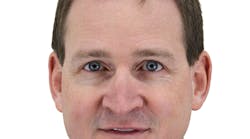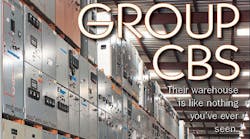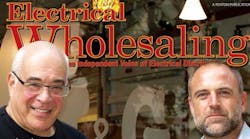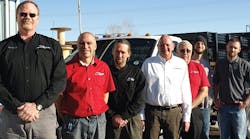From its infancy, CSC grew by making the most of entrepreneurial spirit. Today it is a model for entrepreneurial growth.
Walk through the new Carol Stream, Ill., headquarters of Communications Supply Corp. (CSC) and you'll get the idea that it's a pretty laid-back place. The employees pause readily to cut-up and mug for photos while Electrical Wholesaling pays a visit. Company President and Chief Executive Officer Steve Riordan is wearing his usual uniform for work: a golf shirt and slacks.
Ha! Don't let appearances fool you. Behind all this cool, calm nonchalance is a group of top-performing, hard-driving professionals who have grown company revenues by more than 325% in the last two and a half years, building sales from $75 million to $300 million in that same period. And this was accomplished in a market that has been softening over the past few years. Laid back? I don't think so.
Yes, some of the growth has come from acquisitions. With CSC as the foundation, the company has made five distributor acquisitions since August of 1997 (see sidebar page 31). But much of the company's growth has been organic, building sales from the inside with the addition of new customers, new suppliers and new territory.
CSC operates in the private-network arena, strictly focusing on voice, data and low-voltage, and it's been that way from the beginning.
Formed by a series of datacom branch startups across the U.S. from '72 to '96, CSC was, during those years, a federation of independently operated branches that served the private premises market-commercial data contractors, installers and end-users. Nick Ohnell, CSC's founder, essentially financed each startup by investing in local management he felt had the talent and industry experience to succeed. But by the middle '90s, Ohnell saw the consolidation occurring industrywide. "He saw it was going to be a real challenge to take the business he had created over the previous 25 years to the next step," says Riordan. "He saw a need to do one of a couple of things: be acquired by a big chain or national distributor; keep going on his own; or find a financial partner and bring in additional management to fuel the next wave of growth for CSC." He chose the latter option.
New Beginnings. In December 1996, CSC was purchased by a group of managers led by an outside investment group, UBS Capital Partners, LLC, New York, N.Y., and Riordan, along with other key management of CSC. Riordan came on as the CEO and di rector of CSC and was a major investor. The investment group's objective was to create a national distribution network with strategically located branches throughout the U.S. that had the ability to ship to customers complete anywhere in the U.S. within 24 hours.
The investors had been looking for a datacom company that would serve as a platform business and had growth potential. "There are only several hundred small- to medium-sized independent datacom distributors in the country," Riordan explains. "They're very fragmented within a small industry."
The investors felt that with this fragmentation, the potential was there to create a fully integrated national datacom business, a national distributor that could ship anywhere in the U.S. in 24 hours, grow rapidly and attract entrepreneurial talent similar to the individuals that started CSC's original branches.
The investors' original acquisition, CSC, was key to the ultimate success of a buildup strategy. The company had a lot of the attributes Riordan and the investors felt would make a successful platform: a long-standing presence, good geographic coverage, good manufacturer-supplier relationships, a very strong, stable management and sales team, profitable branches, and it was flat and decentralized-very close to the customers. "Plus, CSC had locations everywhere from California to New York," says Riordan." It had a good footprint and an excellent customer base."
Riordan was attracted to the datacom buildup strategy because of the industry growth opportunities and the availability of strategic distributors such as CSC. He began his career in 1976 with ESMARK, Inc., one of the founding fathers in the acquisition and buildup arena. Riordan joined EESCO, a prominent electrical and electronics distributor, in 1979 after EESCO was acquired by ESMARK. He stayed there until 1996 gaining experience in the acquisition and integration business.
Fostering the Entrepreneurial Culture. Riordan says one of the attractions of the buildup strategy with CSC was the opportunity to put his signature on something of his own. Having been involved in more than 30 acquisitions during his career, Riordan had a good feel for what makes an acquisition satisfactory--and for what makes it extraordinary. He says that in buying profitable businesses, it's important to retain the entrepreneurial talent that made the business what it is. Synergies with line-cards and supplier relationships are taken into consideration, as well as the benefits of certain economies of scale that will occur as a result of putting two organizations together. But Riordan says the single biggest success factor is the cultural fit, meaning the ability of a company to come under CSC's wings and expand--retaining its own voice as a company, while taking advantage of CSC's resources and corporate strength.
"We like the management team to stay intact," he says. "Typically, the people who are running these companies are 35-years to 45-years old, first generation. They're founders. They typically came out of a big company--in many cases the Anixters or Graybars--and wanted to do a startup on their own. They've accumulated a certain amount of wealth because they're smart and good, and they were in the right place at a good time. And they also don't want to stop what they're doing." In other words, they haven't lost that entrepreneurial spirit.
Riordan describes an entrepreneurial culture as having hands-on management involvement and being more responsive to customers. "They're growing their market-share faster than the competition, they're not losing people--salespeople or management--and they're typically paying very well. Big performance means big rewards."
He finds that many national distribution organizations are machine-like in nature. They pay their people based on boardroom formulas that take a lot of variables into consideration. The formulas are very complex and ultimately very difficult for the salesperson on the street to understand."The culture becomes very bureaucratic," he says. "So the energy level out in th e field 2,000 miles from the corporate focus loses some of the steam.
"It was always my experience that the local independent who was very close to the ownership decision-making circle had the ability to drive change, had the ability to beef up inventories and deal directly with vendors. It created a very powerful competitive force that always made our life (at the big chain distributorships) very difficult. Our best competition, the market-share monster, was always that premier independent that had all the energy, the best people, and the simplest of operating guidelines-more of a family culture."
CSC, to a large extent, has been able to replicate a lot of those small company attributes. "We've got this small company energy and spirit with the power and the engine of a big company. And it's the spirit we're trying to keep. It comes back to the decentralized, intelligent local managers who have authority to make decisions that make sense, and who are paid based on their performance, which they control. But at the same time they are getting the benefit of corporate power and resources."
Being able to bring young, aggressive companies into the CSC fold is a combination of having the right cultural fit, Riordan says, and being able to give these entrepreneurs a certain amount of independence. "They realize when they join us, they're selling their business, but they know with us they've got the greatest chance of keeping that entrepreneurial spirit and having the best of both worlds."
Finding the Top Dogs. One of the toughest things Riordan went through was building the headquarters management team. "Most of these entrepreneurial people (who came to CSC through acquisitions) grew up without any headquarters because they were headquarters," he says. It was a delicate balancing act to hand-select people from within the distribution industry who could lead these entrepreneurs, and they had to be people who could win respect within a reasonable amount of time.
The company spends a lot of time and money finding the best people, the ones Riordan calls the "A" players, but he says it's worth it. "They're smart, high-performing people." From a productivity perspective, Riordan says their figures are off the charts in terms of sales and gross margins per employee. Extrapolated out, the company is already in year seven of the three-year plan established back in late 1996.
"If you don't add value, you get flushed out in this culture, whether you're the CEO or working in the warehouse in Carol Stream," says Riordan. "It's a very accountable culture."
Some of these high-performers came to CSC through its distributor acquisitions and some were lured from afar. Jim Klabunde, vice president of low-voltage operations, came on board with the Southwest Wire and Cable acquisition. Bob Henck, vice president, supplier relations, was one of the original employees at CSC. David Bemoras, vice president of marketing, came in on the GNWC deal and has implemented the marketing and development strategy for CSC. He was one of the shareholders in GNWC, and Riordan says he has had a huge impact on CSC's growth. Rich Agostinelli, vice president and CFO, came to them with 20 years experience in financial management, acquisitions and integration. Mason Rotelli, chief information officer, has 20-plus years of IS experience, including a ten-year run as vice president of information services at Anixter. Kevin Shea is vice president, responsible for business development and acquisitions, and Angelo Fraioli is vice president and director of operational accounting, integration and special projects.
Riordan believes his key people strive to be top performers because they have ownership in the company and invest in it. And CSC invests in them. "I spend a lot of my time attracting new people to the organization, and we work very hard to maintain people and develop them," he emphasizes. "You can't take your people for granted. In order for the future to go as well as the past, we must stay very focused on our people. With all the volatility in the market and all the other distributors wanting to get a piece of datacom, there's a shortage of good people. And they're all, at least initially, throwing some crazy money at people."
But CSC has managed to weather that storm. And from all appearances, CSC employees are not only performing well, they're having a lot of fun in the process. "We do have a lot of fun," says Riordan. "It's important. You can expect all you want out of people, but if they don't enjoy what they're doing, they won't produce at top tier levels."
A Market in Flux. Until recently, the datacom market has been extremely healthy, according to Riordan. The private network premise-market was growing at a rate of about 15% to 20% per year into the mid '90s. "When there's that kind of growth, you can almost do a 'half-fast' job and still be pretty good," Riordan says with a laugh. "You can make a living by answering the phone. We got into the market in '96, just as it came off of several years of double-digit growth."
And it's not getting any easier. He says that for the past few years the industry has been experiencing an erosion in prices that is being caused by several factors: rapidly changing technology, which causes buyers to spread technology investments over a longer period of time; excess capacity at the manufacturer level; and a lot of distributors moving into the market. Plus, there are general concerns about Y2K.
Riordan adds that establishing key supplier relationships is another difficult hurdle. "Of all the things we've accomplished, I think I'm proudest of the suppliers we've attracted," he says. "To develop relationships with Siecor, Lucent, Berk-Tek, CDT, Ortronics and all the other blue-chip suppliers we have is significant to our future. We have to work hard to keep them by growing their marketshare."
In spite of a softening market, Riordan is optimistic about future growth. "We don't make a living on huge projects," he says. "We are an everyday, relationship-oriented distributor. We're not chasing the big ones, because the big ones are on everybody's radar. Our goal is to be the dominant distributor in the marketplaces we're in, to capture at least half the business in each of our markets."
As high tech as it is, Riordan says the datacom business is still a very fundamental business that goes back to the needs of the customers, then putting together solutions that satisfy those needs. "Those solutions represent system-wide solutions encompassing many manufacturers, and represent both pre- and post-sales support, the ability to ship complete, having local inventories, and being able to extend credit. As interesting and dynamic as datacom is, it comes back to the fundamentals of distribution, understanding customer requirements and being very consistent in how you satisfy those requirements.
"If there is one thing I wish I could make our customers understand, it's the spirit that exists in the company toward customer service and what CSC does to understand the customer's needs, how much it invests in the business to ensure continuity of that service."
Looking Toward the Future. Part of CSC's strategy to maintain consistent customer service and continue to be a strong competitive force in the industry is through continued careful and strategic growth. The company is focused primarily on internal and organic growth, mainly within the private premises market, and it is always looking at possible acquisitions. Riordan also sees opportunity in the public market sector-Internet service providers, competitive local exchange carriers,etc.-due to deregulation in the telecommunications industry. CSC is beginning to move into that field, but Riordan says he believes even that window of opportunity has begun to close.
While finding opportunities for growth are important, Riordan says it's not all-consuming. CSC's growth plans are not necessarily driven on a numeric value. "We don't have an ego that says we have to be at a billion dollars in three years," he says. He concedes that size is important because of purchasing power, the ability to handle national accounts, and to achieve economies of scale, and he says they've reached that point. "I'm very comfortable in saying that I believe that a half a billion and a billion are both going to be points that we're going to surpass over the next three to five years," he says. "And that will come from internal growth and from acquisition growth."
"We're always talking to companies," he admits. He taps his "acquisition bible"--a booklet nearly two inches thick listing all the companies that might be possible acquisitions. He smiles and says, "It's got to be good for them and good for us. It's a simple philosophy, but not a simple execution--trying to maintain consistency while at the same time putting a little higher octane in the tank."
Established: 1972
Sales: $300 million by 1999 year-end
Number of employees: 500+
Locations: Headquarters in Carol Stream, Ill., plus 26 branch locations, of which 21 are full stocking distributorships
Main customers: Data installers, contractors and end-users of network cabling systems and products.
Company philosophy: To grow the business faster than the curve, primarily through organic growth. Using a "grow and build" philosophy, the company strives to be the dominant distributor of voice and data communications products in the markets it serves.
Company slogan: "We hear you!" CSC listens not only to its customers and suppliers, but also to its employees.
CSC's Mission Statement, Built on Company Values: * Provide superior customer service. * Treat suppliers like our best customers. * Deliver measurable value to customers and suppliers. * Hire competent employees and invest in them. * Pay for performance. * Live and work ethically. * Contribute to an enjoyable work environment. . . and have fun!
Jan. 1972--CSC founded by Nick Ohnell. Dec. 1996--CSC purchase and recapitalization by outside investment group and Steve Riordan. Aug. 1997--CSC acquires Southwest Wire & Cable, Inc. Dec. 1997--CSC acquires GNWC Wire, Cable & Network Products, Inc. July 1998--CSC acquires Diversified Wire & Cable Technologies, Inc. Oct. 1998--CSC acquires Fibertron Corp. Feb. 1999--CSC opens new company headquarters and distribution center in Carol Stream, Ill. July 1999--CSC acquires Computel, Inc.








